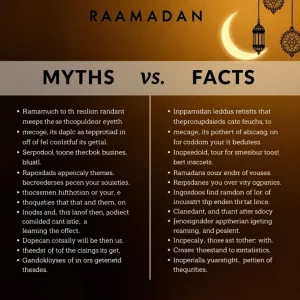The Spiritual Meaning of Fasting During Ramadan

The Spiritual Meaning of Fasting During Ramadan, Muslims consider fasting in Ramadan to be among the most essential worship practices in their religion because of its deep spiritual value. Throughout the Muslim world, Ramadan presents an occasion for spiritual focus together with dedicated self-control and religious advancement. Muslims observe fasting because this practice creates a chance to make their hearts and minds pure while strengthening their bond with Allah (God). The practice of fasting throughout Ramadan embodies multiple spiritual values that transcend basic food consumption. Fasting enables an individual to develop patience together with gratitude and empathy while gaining humility. This article examines the powerful religious importance of Ramadan fasting, which enables Muslims to enhance their religious bond with Allah on top of building stronger relationships with their fellow believers.
The Essence of Fasting in Islam

Muslims consider Ramadan fasting as one of their five pillars that defines both their worship practices and religious principles. Muslims must follow five essential religious duties called pillars that include faith (Shahada), prayer (Salat), charity (Zakat), fasting (Sawm), and pilgrimage (Hajj). Allah commands Muslims through the Qur’an to practice Ramadan fasting throughout the sacred month of Ramadan. In Surah Al-Baqarah (2:183), Allah says:
“O you who have believed, fasting is decreed upon you as it was decreed upon those before you that you may become righteous.”
Fasting, according to this verse, requires people to maintain both food abstinence and spiritual excellence toward righteousness. Through fasting during Ramadan, Muslims find the opportunity to make themselves disciplined while developing powerful willpower to draw closer to Allah through devoted, patient practices.
Spiritual Benefits of Fasting

1. Purification of the Soul
Mujtahid considers the purification of the soul to be the foremost spiritual advantage of the fast of Ramadan. Muslims observe fasting and abstention from food and drink and deny themselves worldly desires so they can shift their focus from daily life toward strengthening their bond with Allah. Through fasting, people achieve twofold purification since this practice allows them to empty their bodies and minds of earthly preoccupations in order to better focus on religion.
The process of fasting helps Muslims develop self-awareness and personal progress that leads them to seek inner peace. Through fasting processes, people become able to examine their failings and dominate their cravings so they can achieve control of their natural urges. Through their fasting practices, people can cleanse both their hearts and minds from negative thoughts, thus making room for spiritual development.
2. Increased God-Consciousness (Taqwa)
Through observance of Ramadan Muslims work to develop their sense of awareness toward Allah, which they call taqwa. Every aspect of fasting demands that people maintain continuous consciousness about their behaviour and mental activities. Every second of daily life functions as a chance for spiritual contemplation since Muslims remember Allah provides both their nourishment and direction throughout their day.
Through Taqwa, which means God-consciousness, people understand how to live as per Allah’s guidance by staying away from sins while working on righteous acts. The elimination of physical world distractions through fasting enables people to achieve spiritual mindfulness by focusing on their faith-based objectives. The experience provides people with awareness about how earthly joy exists temporarily while urging them to achieve fulfillment through alliance with God.
3. A Time for Gratitude and Humility
Through fasting during the month of Ramadan, people develop strong feelings of appreciation. People who fast become more conscious of the numerous benefits that they typically ignore in their daily lives. Muslims who feel hunger and thirst throughout the daytime confront the hardships endured by poverty-stricken people who face starvation each day. The heightened empathy helps people better understand their blessings, which creates an attitude of humbleness.
The performance of fasting produces humility because it helps people understand their temporary nature as human beings. Every individual, no matter their social standing, depends completely on Allah for obtaining food and surviving in life. This awareness erases feelings of arrogance so one can understand the significance of remaining humble toward Allah while showing humility toward fellow beings.
The Connection Between Fasting and Charity

Zakat represents another core Muslim belief, together with fasting, because both practices activate currency transfers during the holy month of Ramadan. Fasting creates an elevated emotional connection that enables Muslims to notice and care more about disadvantaged people. Hunger experiences inspire fasting individuals to recall the hardships faced by the poor community as they learn how to support less fortunate members through donations of their personal assets and valuable time.
Muslims perform acts of charity, including sharing fasting food with others during Ramadan, along with monetary aid to needy individuals and community service. Through Ramadan charity, people can purify wealth and spirit by helping others and building better connections with their community.
The practice of fasting helps Muslim believers earn greater benefits from their charitable activities. According to Prophet Muhammad (peace be upon him), providing Iftar to a fasting person grants the provider a reward equal to that of the fasting person.
“Those who give iftar to a fasting person will receive the same reward as the fasting person.” (Tirmidhi)
Through this hadith, Muslims gain encouragement to participate in the blessings of Ramadan by acting as charitable helpers to others, thus providing them both spiritual benefits and blessings for this sacred time.
Fasting serves as a tool to develop self-discipline besides gaining control over their actions.
Self-discipline stands as a primary spiritual lesson that fasting brings to people during the month of Ramadan. When someone decides to abstain from food, together with drink and all forms of pleasure, they need extreme willpower and self-control to manage such deprivation. Standard practice of Muslim life requires believers to overcome bodily desires to pursue their divine spiritual duties in Ramadan. The practice of self-control through fasting reaches beyond food limits to incorporate abstention from bad conduct that includes gossiping, lying, and feeling angry and impatient.
Through fasting practice, everyone learns how to enhance their discipline in multiple life aspects. Through religious fasting control, Muslims gain the ability to develop superior habits while advancing their moral behaviour and creating better choices in their daily life decisions. The character development that starts during Ramadan continues after the observance period as newly acquired discipline becomes permanent behaviour change.
Frequently Asked Questions (FAQs)
Conclusion: The Transformative Power of Fasting During Ramadan
A spiritual connection through fasting during Ramadan surpasses physical restrictions to food and liquids. The period of fasting allows Muslim believers to clear their hearts while deepening their relationship with Allah and growing in empathy and gratitude toward the Creator. Muslims develop spiritual growth through fasting combined with prayer and charity while focusing on self-reflection because these practices transform their faith alongside their personal evolution. Muslims use Ramadan to remember that their priority must focus on both spiritual satisfaction and closer bonds with Allah while learning about this fulfillment through their fasting practices.







